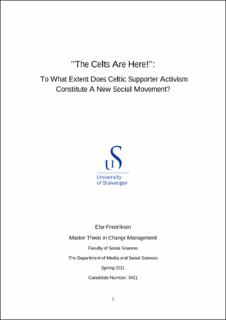| dc.contributor.advisor | Thesen, Gunnar | |
| dc.contributor.author | Fredriksen, Else | |
| dc.date.accessioned | 2021-10-21T14:06:42Z | |
| dc.date.available | 2021-10-21T14:06:42Z | |
| dc.date.issued | 2021-01 | |
| dc.identifier.uri | https://hdl.handle.net/11250/2824575 | |
| dc.description | Master's thesis in Change management | en_US |
| dc.description.abstract | There is a dynamic and interesting intersection between football and activism. As the world's most popular sport, football can be a formidable platform for activism. In this master thesis I will explore activism conducted by the supporters of Celtic FC. Social and political activism have strong traditions amongst Celtic supporters and in the Celtic community. The football club was founded as a charity in 1887 by the marginalized Irish-Catholic immigrant community in Glasgow. The purpose of this study is to gain insight into the social and political activism conducted by Celtic supporter activists.
My research question was: to what extent does Celtic supporter activism constitute a new social movement? To find the answer to this, I conducted four field trips to Glasgow and Belfast. Here I used qualitative methods including 12 in-depth interviews, participant-observations and field conversations to gather data. This was in turn analyzed. I used new social movement theory as a theoretical framework. This theory considers both the structural and identity as being important to social movements (Peoples, 2019, p 17). I also explored the roles free space and collective identity play for social movements drawing on the work of Polletta (1999) and Polletta and Jasper (2001). In addition, I tried to reconceptualize new social movement theory as well as the roles of free spaces and collective identities by drawing on research in sport sociology on these concepts.
I found that that Celtic supporter activism to a large degree constitutes a new social movement. Both the structural and identity are important in Celtic supporter activism. Firstly, Celtic supporter activists often fulfils Peoples (2019) requirement for social movements which are: “groups of people organizing to bring about – or resist – social change, using at least in part, non-institutional strategies and tactics” and often having social injustice and social inequality as core concerns which they mobilize around (p. 17). Secondly, Celtic is and has always been an important free space for its supporters. Collective identities which in turn fuel Celtic supporter activism are formed here. I found specifically six collective identities which play prominent roles in Celtic supporter activism. These are the Irish, Catholic, immigrant, inclusive, left-wing, and working-class collective identities. Furthermore, my research indicates that activism often is an important and integral part of Celtic supporter activists' lives, where it becomes something which is more than activism. | en_US |
| dc.language.iso | eng | en_US |
| dc.publisher | University of Stavanger, Norway | en_US |
| dc.relation.ispartofseries | Masteroppgave/UIS-SV-IMS/2021; | |
| dc.rights | Navngivelse 4.0 Internasjonal | * |
| dc.rights.uri | http://creativecommons.org/licenses/by/4.0/deed.no | * |
| dc.subject | fotballsupportere | en_US |
| dc.subject | football supporter activism | en_US |
| dc.subject | new social movement theory | en_US |
| dc.subject | Celtic FC | en_US |
| dc.title | "The Celts Are Here!": To What Extent Does Celtic Supporter Activism Constitute a New Social Movement? | en_US |
| dc.type | Master thesis | en_US |
| dc.subject.nsi | VDP::Samfunnsvitenskap: 200 | en_US |

